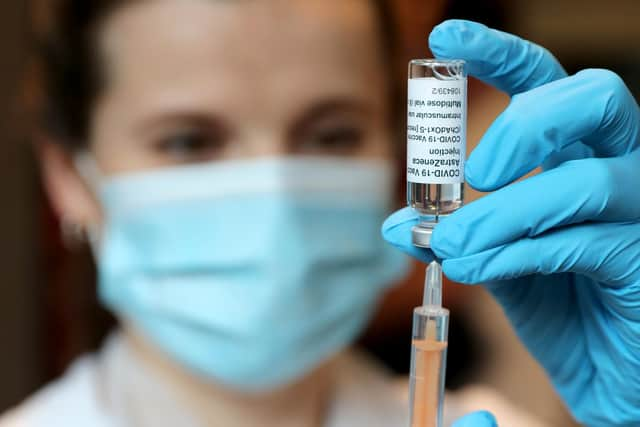Does the AstraZeneca vaccine cause blood clots? Why under-30s are to be offered an alternative to jab in UK
and live on Freeview channel 276
People under 30 in the UK are to be offered an alternative to the Oxford-AstraZeneca Covid vaccine due to increasing evidence linking it to rare blood clots in young adults.
The decision by the government’s vaccine advisory group, the JCVI, follows a probe into the jab by the UK’s Medicines and Healthcare products Regulatory Agency (MHRA).
Advertisement
Hide AdAdvertisement
Hide AdSome UK drug safety experts have said there could be a causal link between the vaccine and rare blood clotting events, including cerebral venous sinus thrombosis (CVST).


So, what are the links between the AstraZeneca vaccine and blood clots?
Here is everything you need to know.
Why are under-30s to be offered an alternative vaccine?
The decision to offer Britons aged 18-29 an alternative to the AstraZeneca jab was made by the Joint Committee on Vaccination and Immunisation.
The MHRA review found 79 people in the UK had suffered rare blood clots after being vaccinated, and 19 had died.
Advertisement
Hide AdAdvertisement
Hide AdBut the regulator said this was not proof that the vaccine had caused the blood clots, although the link was becoming firmer.
It said the side-effects were extremely rare and the jab had been proven to be effective against Covid.
That means the benefits of taking the vaccine outweigh the risks for the vast majority in the country, the MHRA said.
However, the risk from Covid is much lower in young people which is why the decision to offer an alternative was taken by the JCVI.
Advertisement
Hide AdAdvertisement
Hide AdThe government’s vaccine advisory group has recommended that people in that age range should be offered a different jab where available, but people who have already had their first dose of the AstraZeneca vaccine should still receive their second.
The MHRA said only those who suffered one of the rare blood clots after their first dose should not be vaccinated again.
Meanwhile, people who are at risk of blood clotting should discuss getting the vaccine with their doctor before going for one.
What have experts said about blood clots?
Scientists have stressed that the side-effects are extremely rare, while the benefits of getting the AstraZeneca jab to protect against Covid outweigh its potential risk for most people.
Advertisement
Hide AdAdvertisement
Hide AdAnd they have called for vaccine programmes to continue, although doctors have been alerted to CVST symptoms including headache, blurred vision and fainting.
Prof Saad Shakir, the director of the Drug Safety Research Unit (DSRU) at Southampton University, said that the evidence gathered in Europe and the UK of links between the jab and rare blood clots “is consistent with causality”.
But he said the vaccination effort must not stop due to the dangers of coronavirus.
Instead, he called for measures to be put in place to reduce any risk to women under age 55, who seem to be most affected.
Advertisement
Hide AdAdvertisement
Hide AdBoth the MHRA and the European Medicines Agency (EMA) had previously said there was no evidence to suggest that the jab has caused rare blood clots.
The EU’s medical regulator also announced the findings of its own review into the vaccine on Wednesday 7 April, saying that “unusual blood clots” should be listed as a “very rare” side-effect of the jab.
The suspension of the trial of the Oxford-AstraZeneca vaccine on children, which started in February, came after an EMA official said there appeared to be a link with the jab and rare blood clots when speaking in a personal capacity.
Confirming the trail was being paused, Prof Andrew Pollard from the University of Oxford told the BBC: "Whilst there are no safety concerns in the paediatric clinical trial, we await additional information from the MHRA on its review of rare cases of thrombosis/thrombocytopaenia that have been reported in adults, before giving any further vaccinations in the trial."
Advertisement
Hide AdAdvertisement
Hide AdOn Tuesday 6 April, the EMA denied it had already established a causal connection between the vaccine and rare blood clots.
How many people have been affected by blood clots?
According to the most recent MHRA update, 30 cases of CVST and seven deaths were reported in the UK after more than 18 million people had been given the jab.
Elsewhere, there have been reports of CVST cases in Germany and cases of blood clot clusters in Norway, the Netherlands and Denmark.
Currently, Germany, France, the Netherlands, Sweden and Canada have restricted the use of the vaccine in younger people and Denmark and Norway have halted the rollout.
Advertisement
Hide AdAdvertisement
Hide AdOther countries, like Greece, Italy and Portugal, are using the jab without any restrictions.
What did Boris Johnson say about the vaccine?
While he was visiting the AstraZeneca manufacturing plant in Macclesfield on Tuesday 6 April, the Prime Minister defended the vaccine.
He said: "On the Oxford-AstraZeneca vaccine, the best thing people should do is look at what the MHRA say, our independent regulator - that's why we have them, that's why they are independent.
"Their advice to people is to keep going out there, get your jab, get your second jab."
Advertisement
Hide AdAdvertisement
Hide AdMr Johnson added: "The best thing of all is to vaccinate our population, get everybody out getting the jab, that's the key thing and that's what I would advocate, number one."
On the day the JCVI made its announcement, Mr Johnson, who has received the AstraZeneca vaccine himself, said the government believed it was “safe”.
He told reporters while in Cornwall: “The crucial thing for everybody is to listen to what the scientists, the medical experts have to say later on today.”